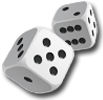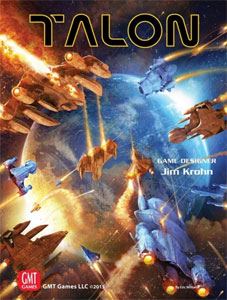



play board games
Board game reviews, strategy tips & session reports
Talon Board Game Review
 Stats:
Stats:
No. of players: 2-6
Amount of time to play: 60-90 min
Age requirements: 12+
Set-up time: 5 min
Talon is a space fleet battle game between human and alien capital ships. Each ship has a Power Curve you can manipulate in game to best outfit a ship for the current situation.
Talon Rules Description:
Talon is a scenario-driven game. The different scenarios give you set up instructions, your fleet and victory conditions. The Talon player usually starts with initiative.
Every ship in your fleet has a starting Power Curve of three numbers between zero and six. One represents the ship’s Power, the next its Speed, and the last one, its Turn Radius. The game is played out over rounds that are divided into six Impulses lettered A through F. When either the Power or Speed of your ship shows in the current Impulse it acts. If both players have ship that activate in an Impulse they activate all their ships in initiative order.
When the Impulse shows your ship’s Power you may spend an Action Point (AP). APs may be spent to recharge one of your weapons, reinforce a shield arc, grab or hold the initiative, or better maneuver your ship by side slipping or powering through a turn.
If the ship’s Speed value is in the current Impulse it must move. You can move your ship one hex or turn one hex side. If you turn your ship it cannot turn again until it has moved forward a number of hexes equal to its Turn Radius.
You can attack during any Impulse but your weapon must be charged and have a valid target. You roll on a chart based on how far the target is from you. Damage is different depending on the weapon fired. Damage is taken to shields in the arc of the ship you hit. Once shields are down you hit the hull. This can cause critical damage and effects the damaged ship’s Power Curve.
After the Impulse ends, the Power Phase starts. In it you may charge your weapons and adjust your Power Curve. When you change a ship’s Power Curve it will activate more or less often during an Impulse depending on how high its Power and Speed ratings are. And the higher a ship’s Speed the higher its Turn Radius. To end the Power Phase you check if any victory or end game conditions have been meet and advance the round marker.
As you get further along in the scenarios terrain, bases, additional weapons, and how to retreat from battle are added and explained.
A Quick Review of Talon:
Talon is fun sci-fi, skirmish game. You must think ahead and plan how your Power Curve effects which the Impulse phases you can act in and what actions you can take.
The components for this game are really nice. I like the art and how you draw on the ship tokens with dry erase markers to indicate what is damaged, charged or spent. Although you must be careful not to erase an area by accident. I also wish there were two player aids. The rules are well organized. After reading them I watched this rules overview video and it helped a lot.
The way the Power Curve works in Talon is great. If you need to charge your weapons, slow down and increase your Power. Weapons ready and you need to get into a better position? Up your Speed and charge your weapons less.
The Power Curve also adds realism to the game. As you are flying through space the faster you go the harder and longer it takes you to turn. I really like how the mechanic works to improve Talon’s realism.
The different scenarios and number of different ships keeps the gameplay varied. You can create your own scenarios or add the advanced elements to your liking too. There are rules so owners of Space Empires 4X, can resolve battles using Talon.
As I mentioned above, erasing and changing ships’ stats can lead to accidentally removing the wrong thing. This game might feel too fiddly for some, but people used to war games should be ok.
If you are looking for a fun, spaceship skirmish game, check out Talon. Its Power Curve mechanic is unique and makes for interesting decisions.
Score and synopsis: (Click here for an explanation of these review categories.)
Strategy 4 out of 6
Luck 4 out of 6
Player Interaction 5 out of 6
Replay Value 5 out of 6
Complexity 4 out of 6
Fun 4 out of 6
Overall 4 out of 6


Leave a Reply